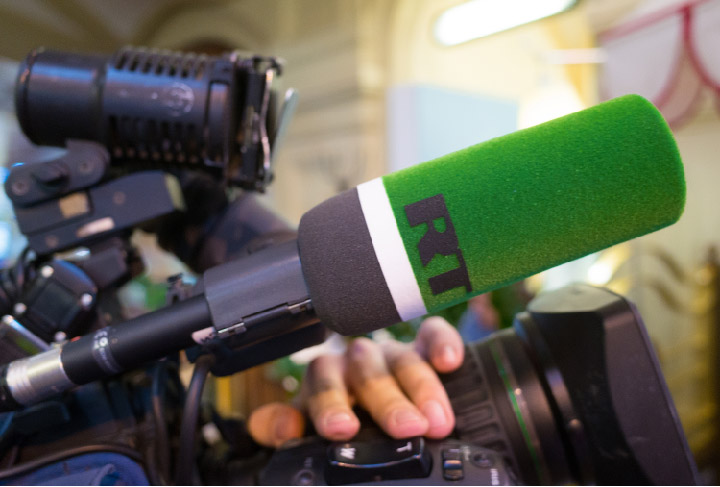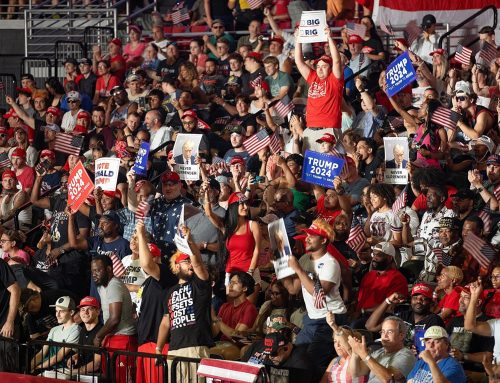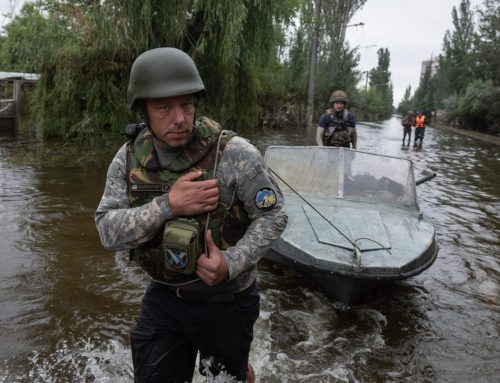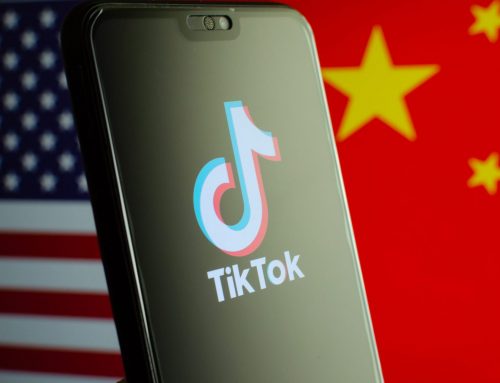Overview
For the first time since the killing of George Floyd in Minneapolis, coverage of racism, police brutality, and related protests did not feature among the top ten hashtags or key phrases (in aggregate) used by Russian, Chinese, and Iranian diplomatic and state-funded media accounts last week. That said, anti-racism protests and additional cases of police brutality in the United States continued to be widely covered, particularly by Iranian media and diplomats on Twitter and on CGTN America’s YouTube channel. As is customary, pandemic coverage dominated the outputs of all three countries, though coverage last week was less antagonistic than noted in weeks past. Outside of pandemic and protest coverage, there was little topical overlap between the three countries, as they each focused on issues more directly related to their own core interests. For Beijing, that meant coverage of the border conflict with India, as well as efforts to paint Xinjiang province as a terrorist hotbed, thus justifying its actions against Uyghurs after President Trump signed the Uyghur Human Rights Act of 2020 into law last week. For Moscow, that meant a return to World War II historical memory narratives, highlighted by a long-form essay penned by Vladimir Putin celebrating the “75th Anniversary of the Great Victory.” And for Tehran, that meant an effort to emphasize its role as a patron to American adversaries Syria and Venezuela, a partner to U.S. major power rivals Russia and China, and a bulwark against U.S. aggression around the world.
Russia Toplines
While the pandemic and ongoing demonstrations against racism and police brutality continued to attract the Russian media ecosystem’s attention, coverage, particularly of the latter topic, died down significantly last week. Small amounts of content on various geopolitical topics coalesced around the ideas that the United States holds itself above international laws, acts out of selfish interests, and continues to alienate its allies. Meanwhile, Russian President Vladimir Putin published a long-form essay on World War II history that reads like a highlight reel of standard Russian government World War II messaging and got substantial play from Russian government and diplomatic accounts on Twitter.
China Toplines
The two main stories for the Chinese propaganda apparatus last week were the border clash that took place on June 15 between India and China, and a full-throated defense of Beijing’s ongoing repression in Xinjiang. Concerning the border clash, Beijing tried to straddle the line between presenting itself as the aggrieved party who nonetheless is willing to compromise, while also making it clear that India risks facing the full might of the People’s Liberation Army and its allies if it fails to fall in line. Regarding Xinjiang, state media and Chinese diplomats worked hand in hand to portray Beijing’s internment of Uyghurs in the province as a proportionate response to barbaric acts of terrorism.
Iran Toplines
Iranian government-linked media last week focused on perceived American lawlessness with respect to both domestic and foreign policy, while casting America’s adversaries as cooperative and unified. This included a continued focus on the protests against racism and police violence taking place in the United States, as well as a specific criticism from Supreme Leader Ali Khamenei of the United States’ environmental record. A secondary thread highlighted collaboration between American adversaries, particularly Iranian assistance to the Venezuelan and Syrian regimes, and cooperation between Iran, Russia, and China.
Russian, Chinese, and Iranian state-funded media and government and diplomatic corps accounts:
Top 10 Hashtags — June 13-19:
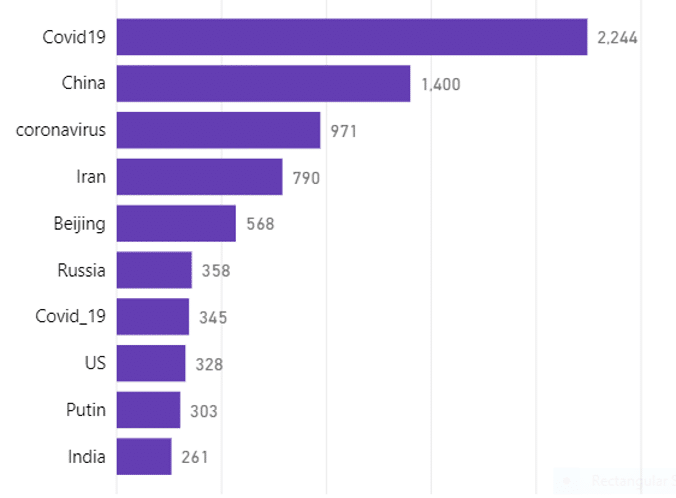
Websites
Russian, Chinese, and Iranian state-funded websites:
Top 10 Key Phrase — June 13-19:
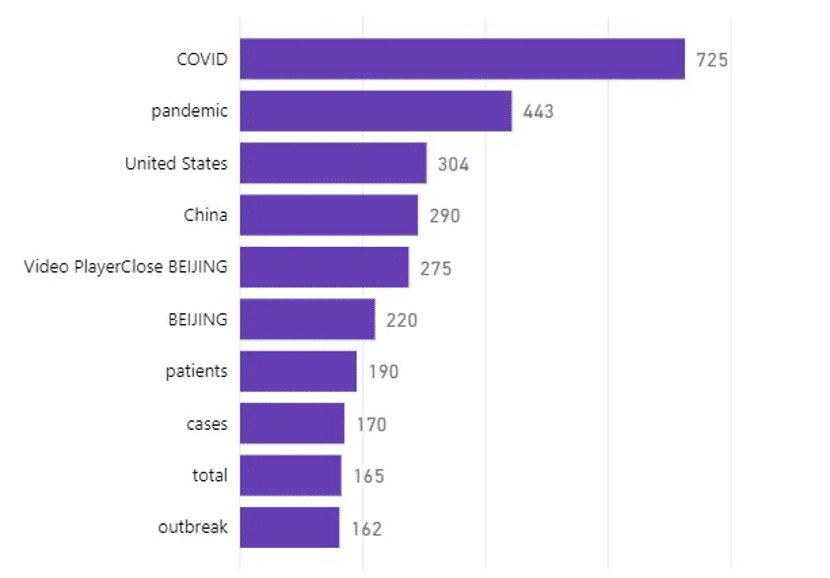
Countries Mentioned
Top 10 countries mentioned by Russian, Chinese, and Iranian messengers on Twitter, YouTube broadcasts, and state-sponsored websites — June 13-19 (NOTE: there is no broadcast data for Iran):
Twitter mentions:
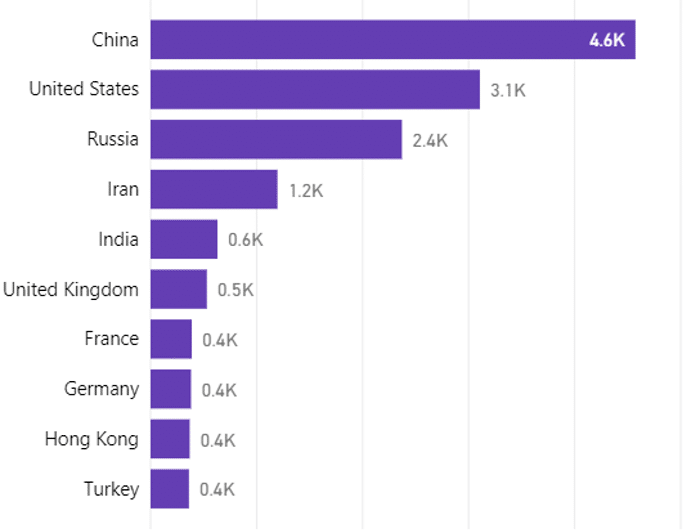
Broadcast Mentions:
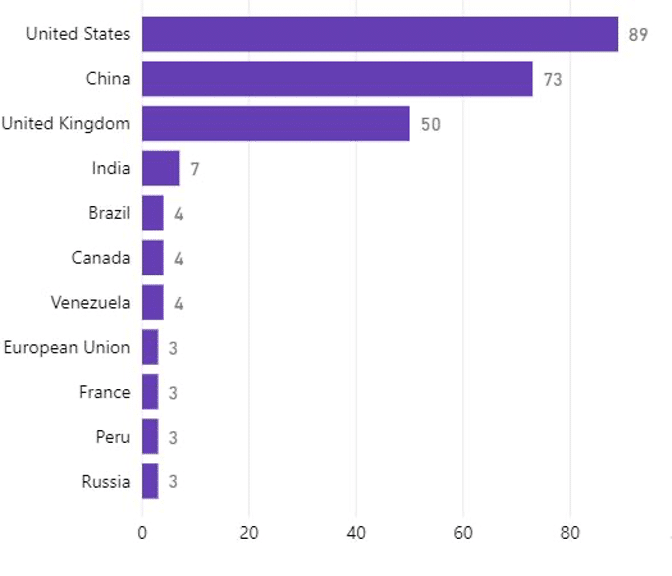
Website Mentions:
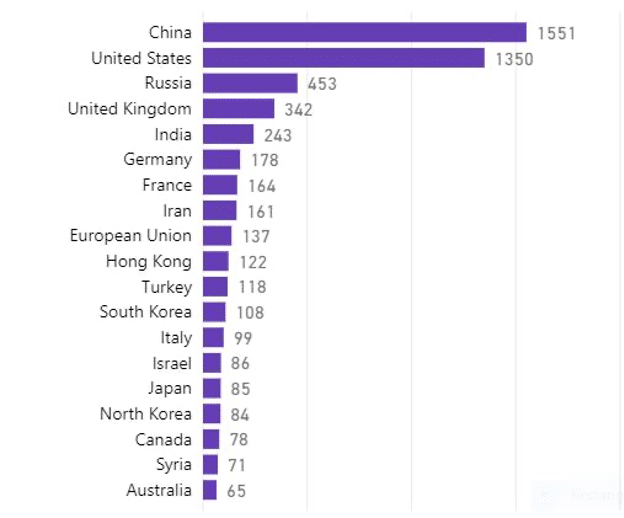
Russia
Russian State Messaging on Geopolitical Developments Paints the United States in a Negative Light
Last week saw the return of a more usual news cycle for the Russian information ecosystem, with no topic particularly dominant across monitored platforms. The week thus afforded an opportunity to examine Russian state-backed media coverage and commentary on various geopolitical developments. One important theme was a characterization of U.S. foreign policy as self-serving and hypocritical, as well as the related idea that the United States increasingly finds itself isolated on the international stage. Topics featuring this type of coverage included new U.S. sanctions on International Criminal Court members investigating U.S. forces in Afghanistan for potential war crimes, and Nord Stream 2 sanctions, among others. It should be noted that U.S. allies’ negative responses to these foreign policy decisions were reported factually, but emphasizing these real gaps fits easily into Russia’s standard playbook of seeking to exacerbate tensions in the transatlantic relationship:

“EU ‘gravely concerned’ about US sanctioning ICC officials investigating its troops, urges DC to reverse its decision,” RT, June 16, 2020.
“The European Union has called on Washington to reverse its ‘unacceptable and unprecedented’ sanctions on International Criminal Court (ICC) officials who are investigating US troops for potential war crimes.”
“US not allowed to tell ICC what to investigate – Galloway,” RT America, June 15, 2020.
“The United Kingdom has opposed its oldest ally, the United States, after US President Donald Trump threatened to sanction International Criminal Court members if they move forward with war-crimes investigations.”

“Germany Views US Sanctions Targeting Nord Stream 2 as ‘Conflicting With Int’l Law’, Minister Says,” Sputnik News, June 13, 2020.
“The Frankfurter Allgemeine Zeitung reported on 12 June citing an internal ministry document that Germany’s Ministry for Economic Affairs and Energy was concerned lest new US sanctions proposed by lawmakers against the Nord Stream 2 gas pipeline project impact not only German and European companies, but federal agencies as well. German Economy Minister Peter Altmaier has issued a warning over the legality of mulled new US sanctions targeting the Nord Stream 2 gas pipeline between Russia and Germany, while underscoring that the move might impair cooperation, reported Bloomberg.”
“Russian Energy Minister Slams US Actions Towards Nord Stream 2 as Interference,” Sputnik News, June 17, 2020.
“US threats to expand sanctions on Russian-German Nord Stream 2 gas pipeline demonstrate interference in the affairs of sovereign states and protectionism, Russian Energy Minister Alexander Novak said on Wednesday.”
“Pompeo demands Europe ditch trade with China and choose FREEDOM over TYRANNY (in favor of US),” RT, June 19, 2020.
“US Secretary of State Mike Pompeo scolded Europeans for not ditching China in favor of the US as a trading partner, claiming that any reliance on Beijing constitutes “abandoning who we are” and prizing “tyranny” over “freedom.” The diplomat denied he was forcing Europe to choose between the US and China as allies, insisting in remarks made at the Copenhagen Democracy Summit on Friday that it was, in fact, the Chinese Communist Party imposing such a choice on them. At the same time, he denied the choice was really between the US and China at all, but “between freedom and tyranny.””
“US presses extraditions to hassle China, Venezuela,” RT America, June 16, 2020.
“The United States is going to great lengths to push for suspects to be extradited from the United Kingdom, Canada, and now Cape Verde. But is it worth the hassle for rivals who don’t pose a direct threat to the United States?”
Although coverage of George Floyd protests decreased last week, one noteworthy exception was an RT article covering an incident at a Ukrainian football match where supporters displayed a banner in support of Derek Chauvin, the ex-cop charged with the murder of George Floyd.
“Ukrainian football fans unfurl ‘Free Derek Chauvin’ banner in support of ex-cop charged with killing George Floyd,” RT, June 17, 2020.
“A banner reading ‘Free Derek Chauvin’, dedicated to the police officer charged in the killing of George Floyd and who is currently being held in custody on a $1.25 million bail, has been unfurled at a Ukrainian football match. The white flag with black lettering spelling out ‘Free Derek Chauvin’ was seen hanging by supporters standing near the middle of the pitch during the Ukrainian Cup semi-final match between FC Minaj and Dynamo Kiev at Stadion Mynai on Wednesday, which Dynamo won 2-0.”
Another topic of interest under the geopolitical umbrella was the U.S. decision to allow U.S. companies to collaborate with Huawei on standards, a change Russian state-backed media attributed to Huawei’s status as a “global leader” in 5G—and a “defeat” for the United States:
“Washington backs down, allowing US companies to work with Huawei on 5G standards,” RT, June 16, 2020.
“The US Commerce Department has issued a change to its sweeping Huawei ban, saying that it will allow American companies to cooperate with the Chinese tech firm on setting standards for next-generation 5G networks. Washington had little choice, as the Chinese telecom giant is the global leader in 5G technology, having filed more than 3,000 patent applications. Ban or no ban, US companies have to pay Huawei for the use of those patents. However, without such cooperation on 5G, American tech firms risk being left behind.”
“Richard Wolff: ‘The United States has been defeated’ in 5G,” RT America, June 18, 2020.
“The US will now allow some cooperation between its telecom companies and Chinese firm Huawei, but does this mean that tensions between Washington and Beijing are beginning to thaw? Professor Richard Wolff, host of the Economic Update, joins the program to offer his take on the issue. We also analyze the race for 5G and whether the US will be able to compete with nations around the globe.”
Finally, as is often the case, mentions of NATO frequently featured criticism of the organization:

“US Media Reveals Why Russia Really Does Have Reason to Be Wary of NATO Invasion,” Sputnik News, June 13, 2020.
“In the three decades since the end of the Cold War, NATO has expanded eastward toward Russia’s borders, staging large-scale drills and deploying potential dual-use strategic weapons systems such as the Aegis Ashore missile defence platforms in Poland and Romania. Through it all, the alliance has the nerve to accuse Moscow of aggressive intentions.”
“NATO’s colonization of Ukraine under guise of partnership,” Op-ed, RT, June 13, 2020.
“NATO has extended yet another in a long line of “incentives” designed to tease Ukraine with the prospects of joining the transatlantic alliance, while stopping short of actual membership. The North Atlantic Treaty Organization (NATO) has designated Ukraine as an ‘Enhanced Opportunity Partner’ . . . At the end of the day, the status of ‘enhanced opportunity partner is little more than that of a glorified minion who trades its own flesh and blood for the false promise of opportunity that will never materialize.”
Putin’s World War II Message Delivers Familiar Talking Points
Last week, Russian President Vladimir Putin published an essay on World War II entitled “75th Anniversary of the Great Victory: Shared Responsibility to History and Our Future.” Diplomatic accounts pushed the piece on Twitter, driving #Putin (and #Путин) to prominent positions in the top ten hashtags. Based on excerpts included in the tweets, the essay featured all of the typical highlights of the Kremlin’s World War II messaging, such as emphasis on the Soviet Union’s losses during the war, patriotic themes, Allied cooperation, and calls to not forget the “truth” of the war or “glorify” Nazi collaborators:
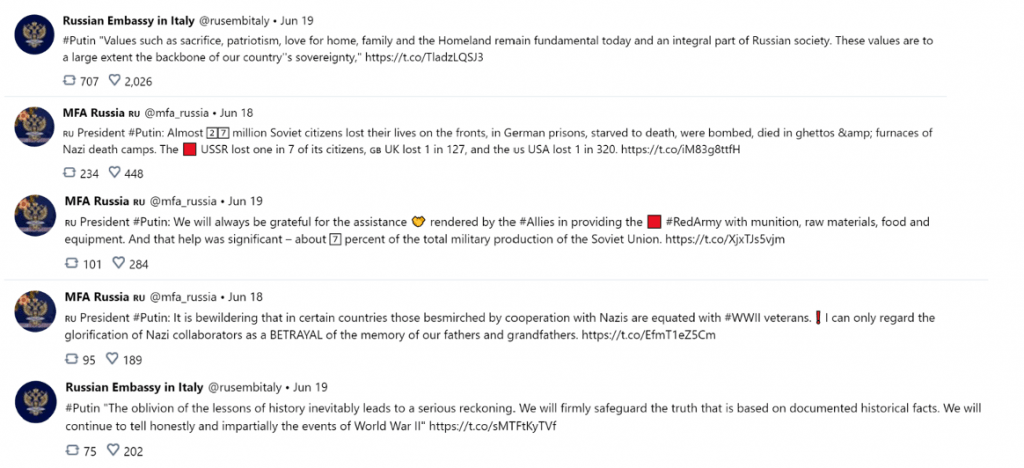
“Putin is ‘Showing Restraint’: Why Russian President Could Have Written WWII Article in Harsher Tone,” Opinion, Sputnik News, June 19, 2020.
“Russian President Vladimir Putin published a long form article denouncing attempts by western governments and media entities to demonize the USSR and diminish its role in defeating fascist Nazi Germany in the Second World War, while turning blind eye on their own shameful acts. In an essay written in the wake of the 75th anniversary of the Victory in Europe, Russian President Vladimir Putin addressed the ongoing variety of attempts at historic revisionism, but stopped short of pointing fingers with respect to West’s role in the start of the Second World War, according to Gilbert Doctorow, an independent political analyst based in Brussels.”
“World needs to know the truth about the history of WWII, Putin emphasizes,” TASS, June 18, 2020.
“Russian President Vladimir Putin says he has no intention to become an arbiter on the history of the World War II, but he believes that the truth about the war is needed to everyone. Putin said so in his article on the history of the War, published in The National Interest journal . . . Crimes of Nazi collaborators cannot be justified, and there is no statute of limitations for them, Putin said.”
“Putin has restored Russia’s national pride – Galloway,” RT America, June 19, 2020.
“Russian President Vladimir Putin has been accused of “rewriting history” for an op-ed he wrote about how the West appears to diminish the former Soviet Union’s role in beating the Nazis during World War II.”
Russian state-funded media and government and diplomatic corps accounts:
Top 10 Hashtags — June 13-19:
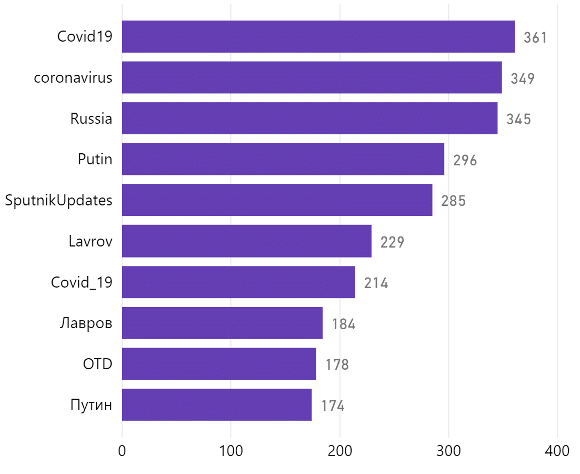
The dashboard collected about 18,000 total tweets from June 13 to 19, of which about 11 percent mentioned “virus,” “covid,” “outbreak,” or some combination thereof—a similar proportion to the previous week. This figure compares to about four percent that mentioned “protest,” “Floyd,” or both. Pandemic coverage continued to focus largely on basic news updates, and the much smaller amount of protest coverage featured dramatic images and emphasized violent incidents. Last week also saw a return to more typical news cycle coverage on Twitter, with several cute animal videos among the top overall tweets by engagement.
Websites
Russian government-funded websites:
About 20 percent of articles on Russian government-funded news websites mentioned “virus” in the first 200 words, which was similar to the previous week. In a rare instance of Russian state-funded media covering a negative story within Russia, the top article on the coronavirus by Facebook shares was an update on the saga of the Russian Orthodox priest who captured a monastery with Cossack fighters after being banned from conducting religious services for not following public health guidelines:
“Ex-NHL star Datsyuk ‘holed up at monastery defended by Cossacks with priest who claims Covid is cover-up to microchip population’,” RT, June 17, 2020.
“Former NHL star Pavel Datsyuk is reportedly among those holed up at a Russian monastery where a priest has seized control and guarded the area with Cossacks after being told to stop services due to his Covid-19 conspiracy beliefs.”
Only about 14 percent of output mentioned “protest” in the first 200 words—a decline from the previous week. The two top articles by Facebook shares related to anti-racism protests (by a significant margin) covered controversial comments made by celebrity boxers and an inflammatory op-ed about British politics:
“‘If I said don’t shop in black stores, I’d be CRUCIFIED’: Fury responds to Joshua’s ‘bullsh*t’ Black Lives Matter speech,” RT, June 16, 2020.
“Tyson Fury says he would be ‘crucified like Jesus Christ’ if he made ‘bullsh*t’ statements similar to those by fellow world heavyweight boxing champion Anthony Joshua at a recent Black Lives Matter protest. Speaking at a protest just outside London earlier in June, Joshua appeared to suggest that those in attendance should boycott white-owned shops.”
“British politicians and the MSM have sent a clear message to the white working class for decades: ‘You don’t matter’,” Op-ed, RT, June 17, 2020.
“‘Far right’, ‘Nazis’ and ‘racists’ are epithets used by the liberal elite as an excuse to demonise patriotic Brits who offend their metropolitan sensibilities. This is class hatred, plain and simple. Bigotry is alive and well in the UK. One form, in particular, is actively encouraged, lauded and laughed about. The victims of it are demonised in the press and for entertainment. These people don’t matter, their opinions don’t matter, their tastes are low-grade, the things they enjoy are looked upon with scorn, and whenever they kick off about all this, they’re vilified or ignored. They are, of course, the white working class. The difference in the tone of coverage of last weekend’s protests compared with the ones the weekend before won’t have passed you by. When Black Lives Matter descended on Westminster to have a riot because a man had been killed 4,000 miles away, the media could not have been more sympathetic.”
Broadcasts
Russian state-owned media:
Notable videos that did not address geopolitical issues included coverage of anti-racism protests and related reexaminations of history. Note that RT America continued to use the chyron “America in chaos” in protest coverage:
“Baseball bat taken to things deemed ‘quintessentially British’,” RT UK, June 16, 2020.
“Britain is having a right meltdown over its colonial past…”
“Protests erupt in Atlanta, policing bill in Congress,” RT America, June 15, 2020.
“Monday marks the 21st consecutive day of nationwide protests following the death of George Floyd in Minneapolis, Minnesota. But now a deadly police shooting involving a black man in Atlanta is triggering more demonstrations. Congressional legislation is being introduced to address police tactics in the US. RT America’s Faran Fronczak reports outside Congress. Then RT America’s Natasha Sweatte reports from San Diego about the protests rocking the West Coast after the alleged hanging death of another black man, Robert Fuller.” Note that this video contains the “America in chaos” chyron.
RT America also accused Google of censorship:
“Google censors websites over right-wing views,” RT America, June 17, 2020.
“Google allegedly threatened demonetization of two right-wing websites, The Federalist and Zero Hedge, because of their views. What does this mean for internet freedom of expression?”
It is worth noting that Zero Hedge, while often portrayed as a right-wing U.S. site, is registered in Bulgaria and often espouses pro-Kremlin views on geopolitics.
China
Border Clash at the Top of the World
Clashes at the border between India and China on June 15 left 20 Indian soldiers dead. In response, Chinese diplomats and state media moved to present Beijing’s side of the story. The number of tweets mentioning India shot up on Tuesday and stayed at a relatively high level throughout the week.

Ministry of Foreign Affairs Spokesperson Hua Chunying and her deputy Zhao Lijian both weighed in on the issue. As is apparent from both accounts, Beijing was keen to present itself as having acted in self-defense and to portray India as the aggressor:

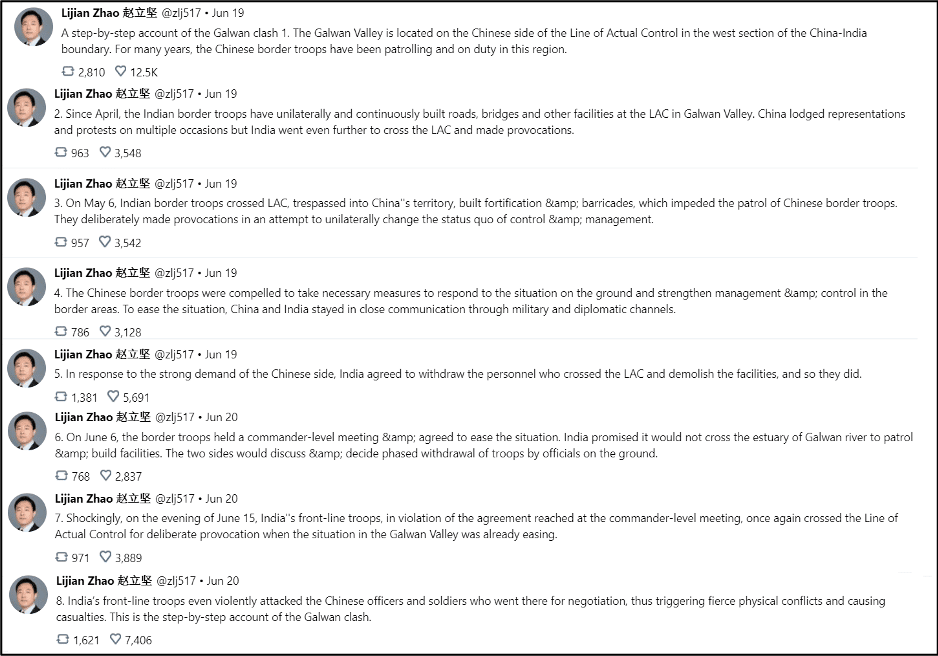
State media coverage of the incident vacilated between articles appealing for deescalation and those that emphasized China’s military superiority. On Facebook, the most shared state media story related to the border clash was CGTN’s “China says overall situation on border with India ‘stable, controllable’,” which explained that “China [urged] the Indian side to stop all such actions which may complicate the situation.”
Other state media pieces adopted a similar tone, including: “China urges India to thoroughly investigate border clash,” “China, India to quickly de-escalate tensions at border: Chinese FM,” “Beijing says it values China-India ties, urges India to meet halfway to de-escalate,” and the cooperation-oriented think piece “China-India relationship should move forward, not backward.”
At the same time, there was a second strand of Chinese messaging that took a harder edge. One of the first pieces published by state media after the incident highlighted a none-too-subtle warning from Beijing: “Chinese military urges India to return to correct track of dialogue, negotiations.” In addition, Hu Xijin, editor in chief of nationalist tabloid Global Times, illustrated Beijing’s sharper power.

Hu’s publication echoed his rhetoric, airing an interview in which Hu recommended that the “Indian elite” stop “self-aggrandizing,” while implicitly blaming the United States for India’s alleged belligerence:
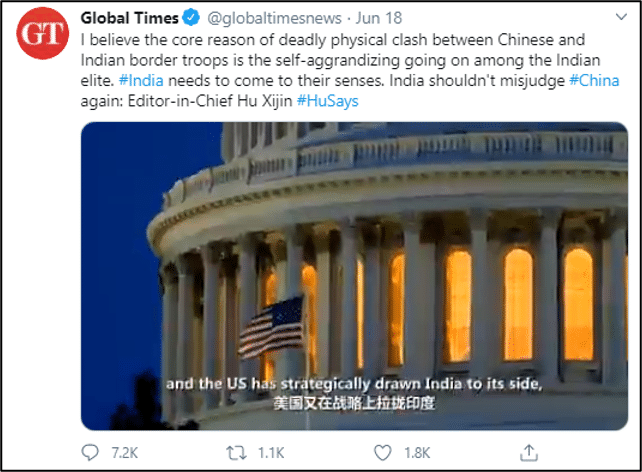
In addition, a key element of Beijing’s more bellicose rhetoric sought to highlight India’s isolation and China’s many allies in the region. A few days after the border clash, CGTN published an article entitled “Nepal toughens stance in its row with Delhi amid China-India standoff,” which explained that “what’s happening between China and India may help Nepal to come out on top of its own land dispute with India.” In a similar vein, CGTN also published a story about tensions between India and Pakistan: “Tensions escalate between India, Pakistan after clashes over Kashmir.”
A couple of tweets from Chinese state media also highlighted India’s border disputes with Nepal and Pakistan, clearly suggesting that the current confrontation with China is part of a broader pattern of Indian aggression:
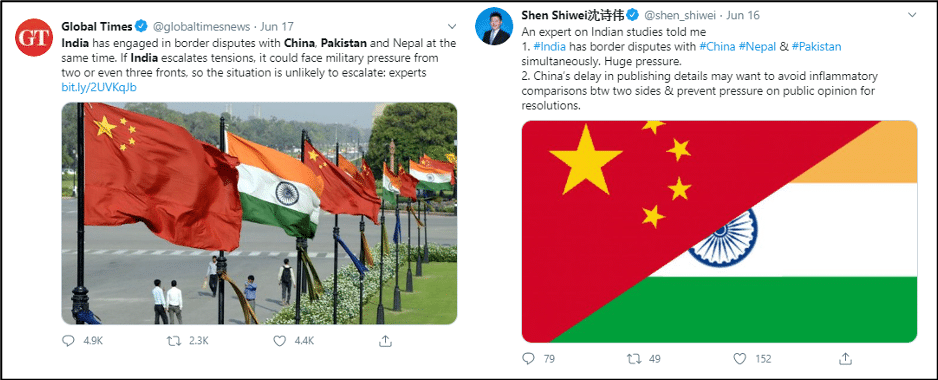
In Defense of Concentration Camps
On June 17, 2020, Donald Trump signed the Uyghur Human Rights Policy Act of 2020 into law. The bill authorizes the imposition of U.S. sanctions against Chinese officials involved in the persecution of the Uygur, a predominantly Muslim ethnic minority living in China’s western-most province, Xinjiang. The entirety of the Chinese propaganda apparatus quickly mobilized to defend Beijing’s policies in the region. By the end of last week, #Xinjiang was the sixth most used hashtag among Chinese accounts monitored by Hamilton, ahead of #HongKong and #XiJinping.
The signature of the Act was strongly criticized by Chinese diplomats. Their main argument was that the Chinese authorities’ repression in Xinjiang was necessary to contain the terrorist threat in the province. According to them, the Act was, at best, interference in Chinese domestic affairs and, at worst, aiding and abetting terrorism in China:
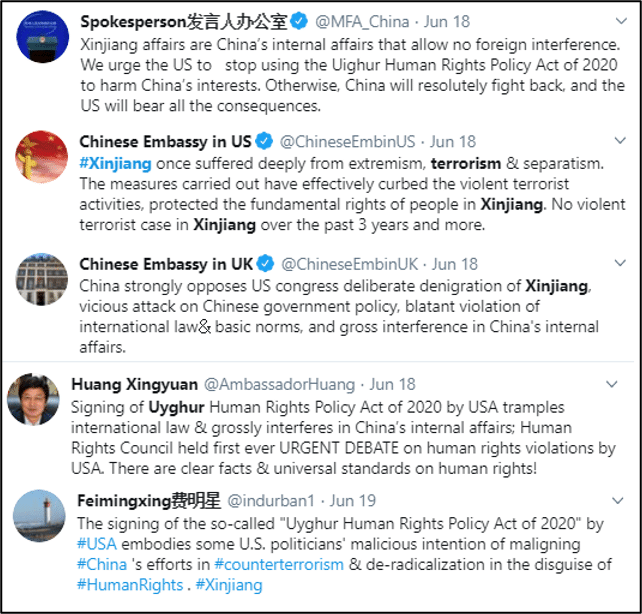
In addition, Chinese state media released several pieces of content, often graphic in nature, aimed at justifying Beijing’s harsh repression of the Uyghurs:
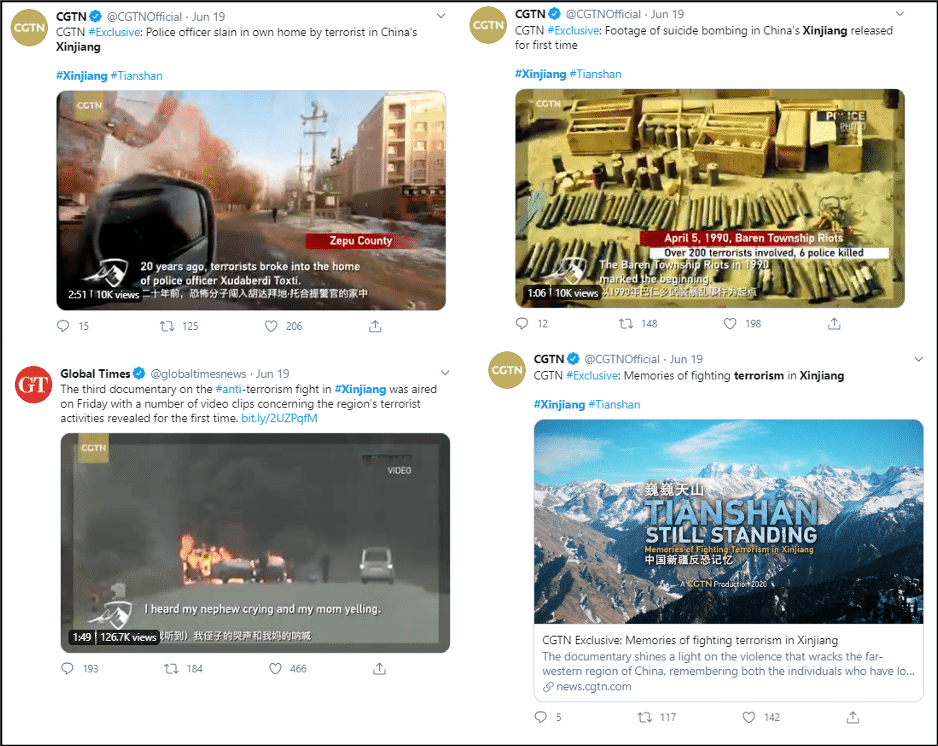
The documentaries were frequently shared by Chinese diplomats and embassies, with officials and state media feeding off each other to amplify Beijing’s narrative:

Connecting conversations related to Xinjiang to terrorism is an oft-used tactic by China’s interlocutors, as evidenced by the fact that in Chinese diplomatic and state media tweets featuring the word “terrorism” over the past 200 days, #Xinjiang is the most used hashtag.
Chinese state-funded media and government and diplomatic corps accounts:
Top 10 Hashtags Related to the Key Phrase “Terrorism” — August 29, 2019-June 19, 2020:
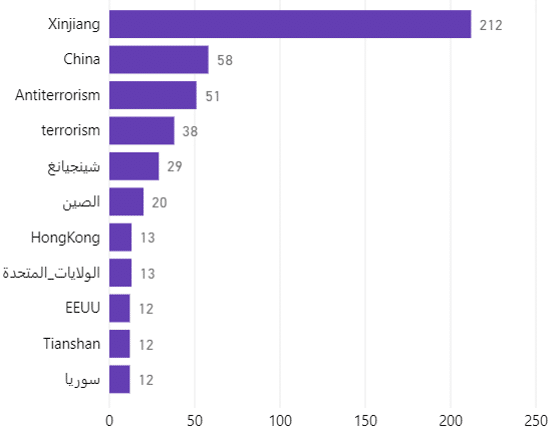
Finally, in a segment entitled “How President Trump’s Uygur bill will affect China-U.S. relations,” CGTN America seized on a passage in former U.S. National Security Advisor John Bolton’s upcoming book, which alleges that President Trump “supported Chinese President Xi Jinping on his approach in Xinjiang.”
Chinese state-funded media and government and diplomatic corps accounts:
Top 10 Hashtags — June 13-June 19:
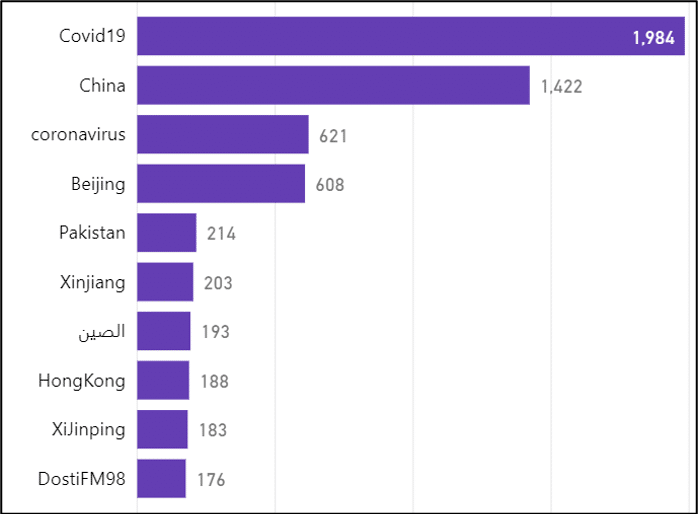
The Hamilton dashboard collected about 15,000 tweets from monitored Twitter accounts between June 13 and June 19, continuing a slight decrease in activity over the past few weeks. In particular, #GeorgeFloyd and #US fell out of the top ten most used hashtags, while #HongKong was down more than 20 percent as compared to the previous week. Meanwhile, the appearance of new coronavirus cases in Beijing triggered a significant increase in the use of #Covid19. As noted previously, #Xinjiang made an unusual appearance in the top ten most used hashtags.
In addition, a couple of prominent tweets mentioned Meng Wanzhou’s continued detention in Canada. At the beginning of last week, Hua Chunying shared her take on a report noting the political sensitivities around Meng’s arrest:
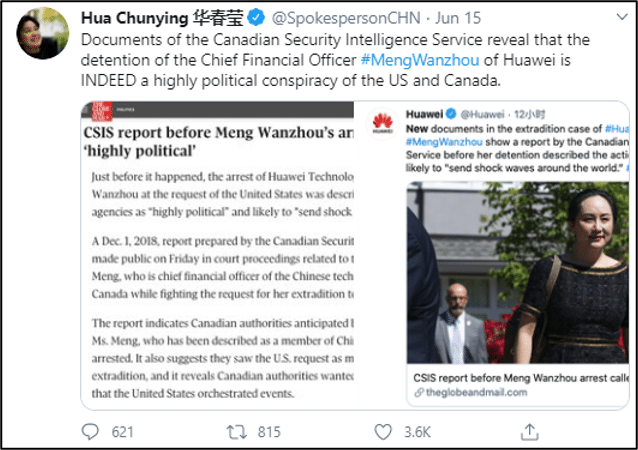
Later in the week, following the announcement that Canadian researchers Michael Kovrig and Michael Spavor were being charged with spying by a Chinese court, the head of China Daily’s EU office, Chen Weihua, tweeted a controversial and provocative take explicitly linking the Canadians’ detention to Meng’s, a charge that Beijing habitually denies. Chen’s tweet has since been deleted:
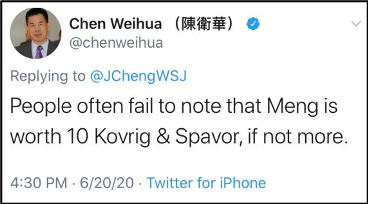
Websites
Chinese government-funded websites:
On Facebook, the most shared state media story this week concerned the progress of Chinese researchers towards a vaccine against the coronavirus:
“World’s first inactivated COVID-19 vaccine proves safe and effective in clinical trials,” CGTN, June 17, 2020.
“A Chinese COVID-19 candidate vaccine has passed phase one and two clinical trials. The vaccine showed no “serious adverse reactions” with all volunteers generating antibodies after two doses in 28 days.”
Another story that was widely shared last week criticized Australia’s government for its supposedly anti-China policies. While articles from two weeks ago accused Australia of being racist, last week’s content had a more geopolitical bent:
“Australia now a ‘U.S. proxy’ in defaming China: Chinese FM,” CGTN, June 19, 2020.
“Australia has become a proxy of the United States especially in defaming China, said the Chinese Foreign Ministry on Friday, citing Australia’s double-standard approach as showed in dealing with international affairs concerning the U.S. and China recently.”
Finally, out of the ten most shared state media stories on Facebook, eight referenced India.
Broadcasts
Chinese state-owned media:
Last week, CGTN America continued to cover demonstrations around Floyd George’s killing, as well as the anti-racism and police reform conversations currently taking place in the United States:
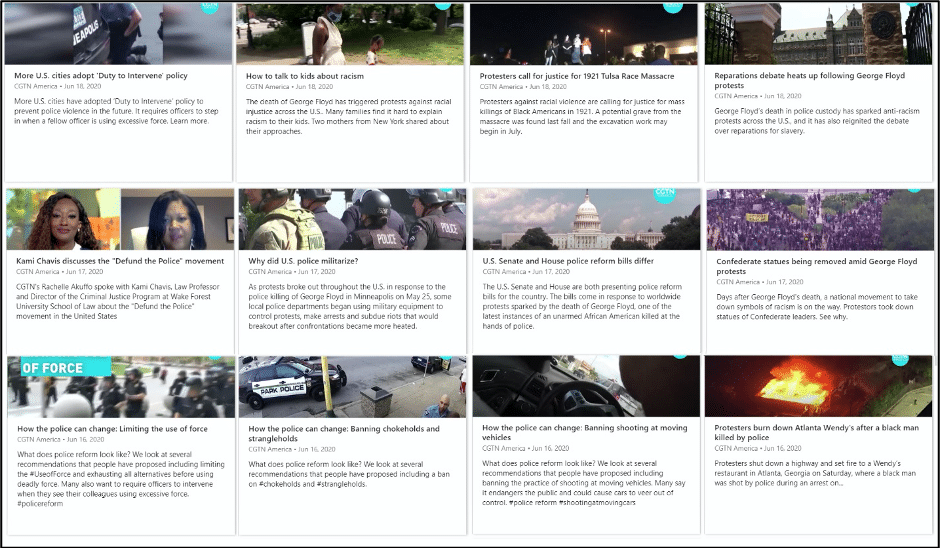
Finally, Chinese state media devoted several video segments to China’s latest technological achievements:
“China’s Yutu 2 Rover Resumes Exploration in Far Side of Moon,” CCTV, June 16, 2020.
“China’s Chang’e-4 probe and Yutu-2 rover resumed work on Monday, Beijing time, after hibernating through the extreme cold of lunar night.”
“China Achieves Quantum Key Distribution over 1,000 Km,” CCTV, June 16, 2020.
“A joint research team led by Pan Jianwei from the University of Science and Technology of China has achieved an entanglement-based quantum key distribution over more than 1,000 kilometers, which is an important breakthrough for making quantum secure communication a reality.”
“Rocket Tests Completed Before China’s Upcoming Navigation Satellite Launch,” CCTV, June 14, 2020.
“China has completed all the function and performance tests on the Long March-3B rocket at the Xichang Satellite Launch Center in southwest China’s Sichuan Province, before sending into orbit the last satellite of the country’s Beidou-3 Global Satellite Navigation System.”
Iran
Coverage of American Protests Casts Them as Indicative of an Irredeemably Unjust Society
Much of Iran’s content in both English and Spanish focused on racism as a quintessential part of American society:
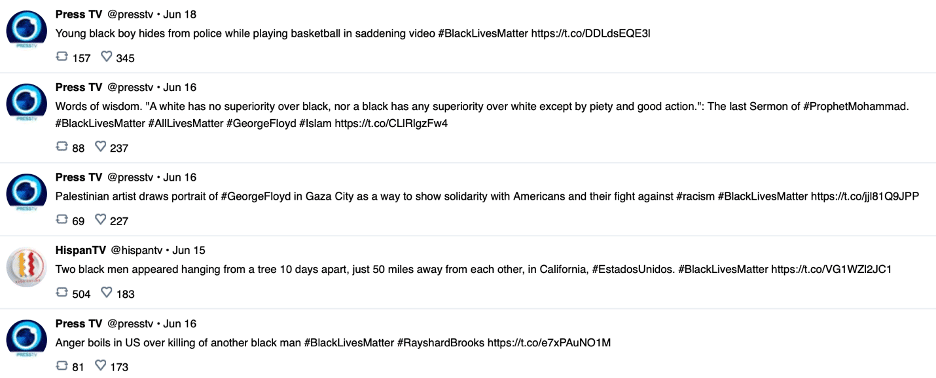
Where possible, Iran tries to focus global attention on social dysfunction in the United States, as it did last week by highlighting a debate in the United Nations Human Rights Council over racist police violence in the United States:
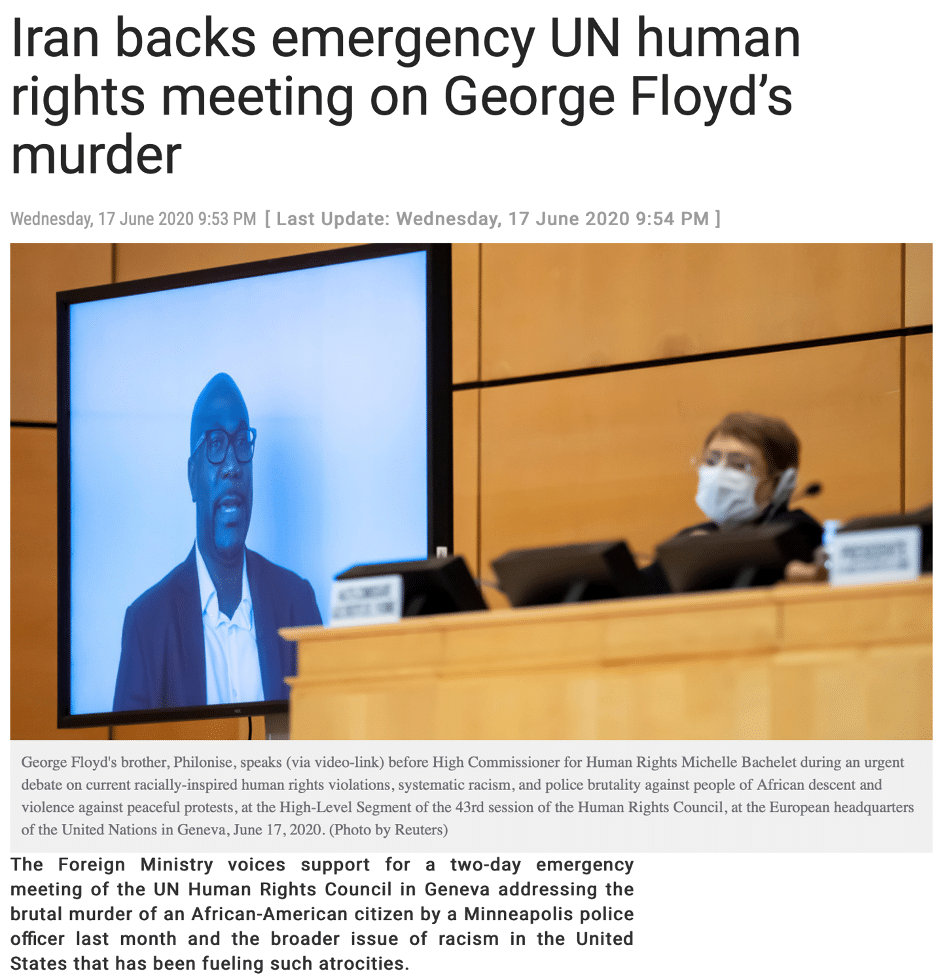
In some cases, the persistence of racial injustice in the United States was explicitly used to delegitimize American criticism of human rights abuses elsewhere, particularly in Iran and its partners, like Syria and Venezuela:


Bolton’s Book Cited as Further Evidence of Dysfunctional U.S. Leadership
HispanTV, Tehran’s Spanish-language news site, used revelations from former U.S. National Security Advisor John Bolton’s book to paint a picture of conflict and incompetence at the highest levels of American governance:
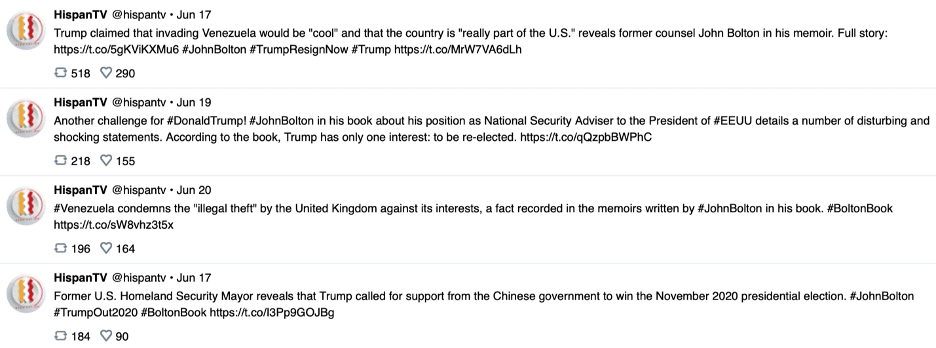
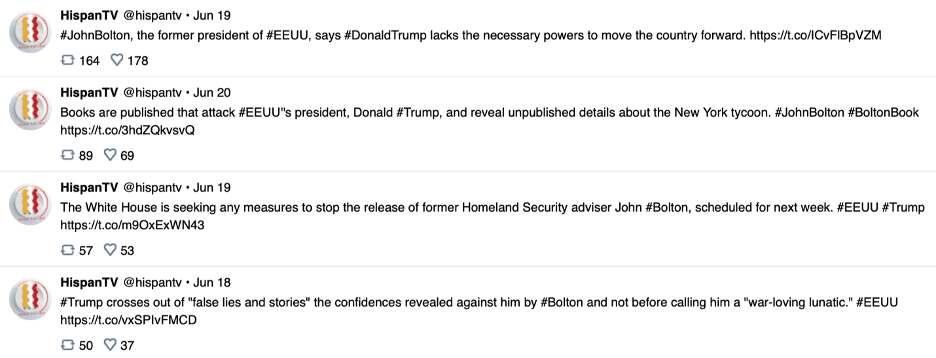
The Supreme Leader himself spoke out on Twitter to castigate American climate leadership:
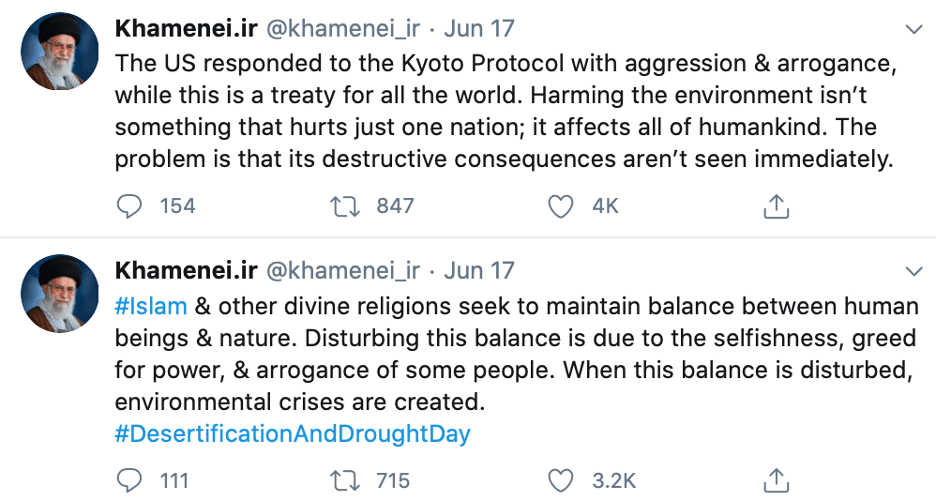
Tehran as a Counterweight to Washington
As is customary, Iranian state-backed media highlighted Tehran’s patronage of minor U.S. adversaries Venezuela and Syria, as well as its desire for greater cooperation with major near-peer U.S. rivals like China and Russia.
In Syria, this narrative consisted of celebrating purported successes by pro-regime forces while castigating American and European sanctions against Damascus:
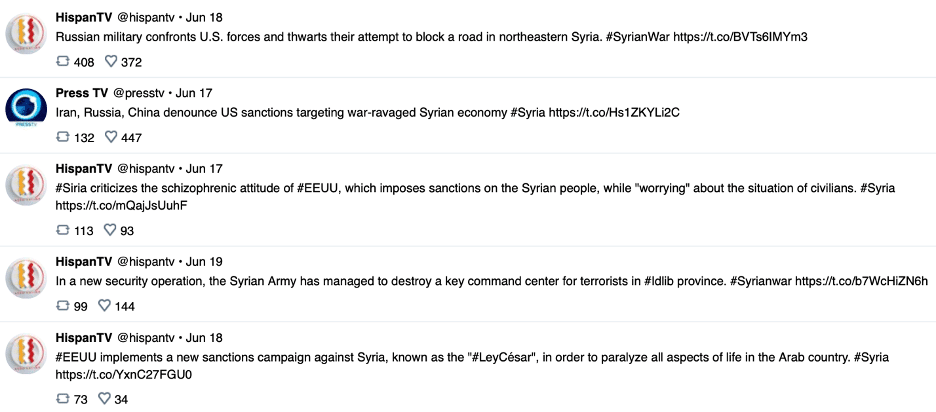
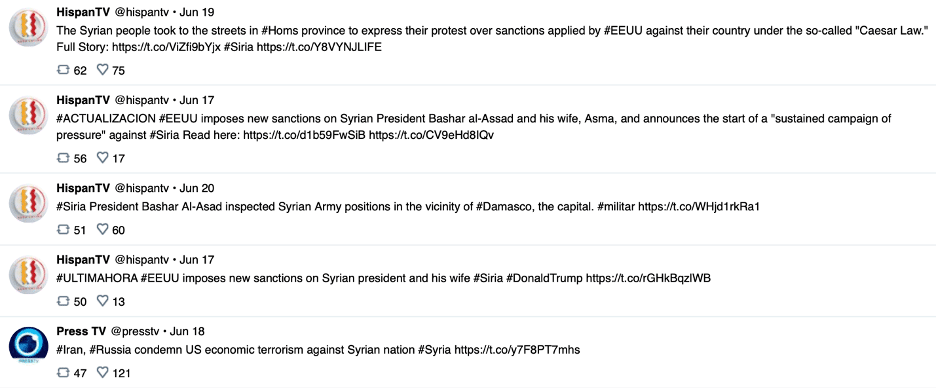
In Venezuela, the focus was on Iranian aid to the country, particularly in the form of shipments of food and fuel, as well as military to military technical support:



At the same time, Iranian media amplified Russian and Chinese narratives, while calling for greater cooperation against the United States:


Where possible, they also played up conflict between and among U.S. allies:

Sharp Criticism of Those Yielding to American Pressure
Iranian outlets sharply criticized the United Nations Secretariat for removing Saudi Arabia from a list of countries implicated in the killing of children:

Iranian media and diplomats, including Foreign Minister Javad Zarif, also blasted the International Atomic Energy Agency (IAEA) for perceived anti-Iran bias:

Finally, Iranian outlets also criticized American sanctions against the International Criminal Court (ICC), which were simultaneously cast as a move borne out of fear that the ICC would investigate American conduct in Afghanistan and an effort to shield Israel from scrutiny:

Iranian state-funded media and government and diplomatic corps accounts:
Top 10 Hashtags — June 13-June 19:
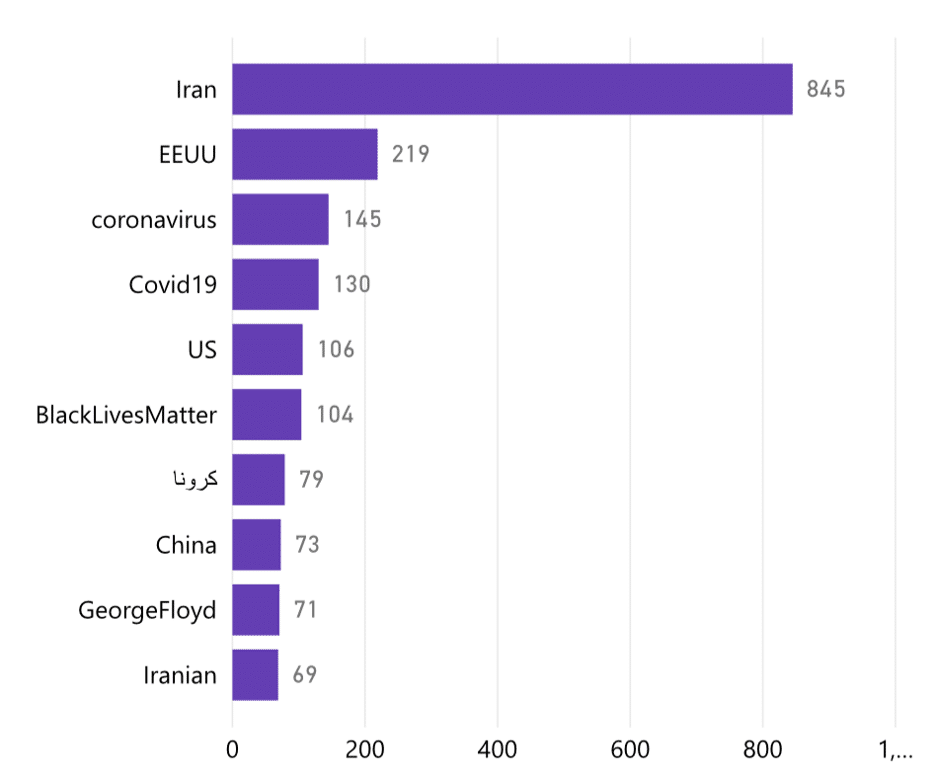
The top ten hashtags from Iranian state-backed media and diplomatic accounts on Twitter reflect the continued focus on injustice in the United States, including police violence, opposition to structural racism, and a flawed response to the coronavirus pandemic. As usual, the #EEUU hashtag reflects the high proportion of Spanish-language content (EEUU being the Spanish acronym for USA).
Four of the top ten most retweeted tweets this week came from Ayatollah Khamenei himself. Two focused on climate change, while the other two discussed the eighth century Islamic scholar Imam Sadiq.
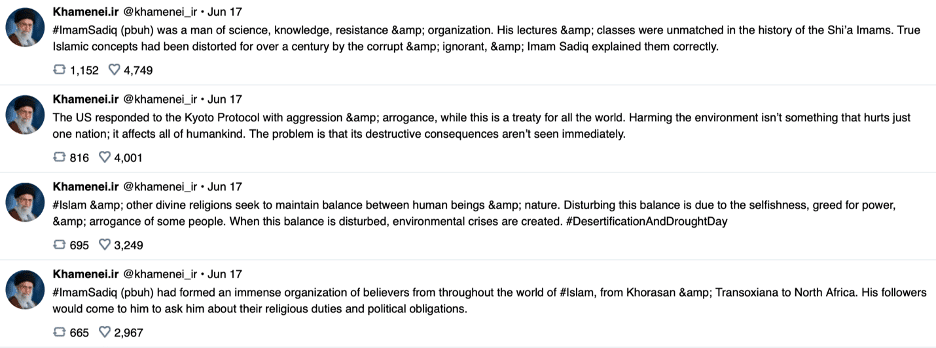
Websites
Iranian government-funded websites:
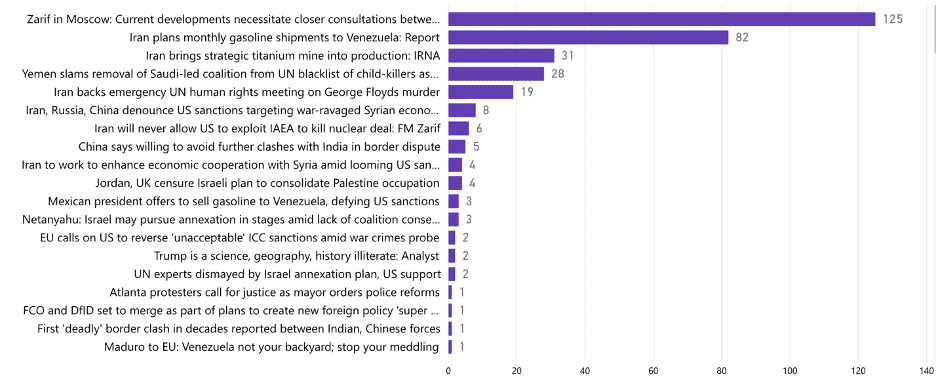
The most engaged-with stories concerned Iranian cooperation with Russia, as well as Iranian aid to Venezuela.
“Zarif in Moscow: Current developments necessitate closer consultations between Iran, Russia,” PressTV, June 16, 2020.
“Iran Foreign Minister Mohammad Javad Zarif says the developments unfolding on the international stage have increased the need for closer consultations between Iran and Russia.”
“Iran plans monthly gasoline shipments to Venezuela: Report,” PressTV, June 16, 2020.
“Iran plans to follow its trailblazing shipment of fuel to sanctions-hit Venezuela with regular gasoline sales despite US threats to punish any facilitation of the cargoes, a report says.”
The views expressed in GMF publications and commentary are the views of the author alone.

